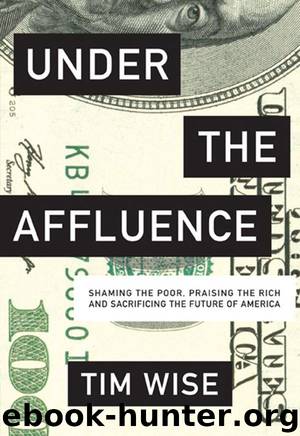Under the Affluence: Shaming the Poor, Praising the Rich and Sacrificing the Future of America (City Lights Open Media) by Wise Tim

Author:Wise, Tim [Wise, Tim]
Language: eng
Format: azw3
Publisher: City Lights Publishers
Published: 2015-09-20T16:00:00+00:00
In short, the rich didn’t build their fortunes: the labor of others who were underpaid for their trouble did. Capitalists, it turns out, may be the most dependent people on the planet.
A Culture of Predatory Affluence: Examining the Inverted Values of the Rich
Not only are talent and hard work inadequate to explain the inflated incomes of the super-rich; so too, their value systems and personal integrity fail to justify their positions. Indeed, while the wealthy and their conservative media megaphones spend time and energy bashing the so-called “culture of poverty” and suggesting that it is the poor and unemployed whose values are dysfunctional, pathological and destructive, the reality is almost entirely the opposite of that charge. If anything, it is the culture and values of the affluent that are the most dysfunctional and destructive to the social good.
Consider, for instance, the value system of executives at one of America’s largest corporations—General Motors. Recently it was revealed that GM had made the conscious decision not to replace faulty ignition switches on certain of their cars, even though they knew that the switches could turn off unintentionally, thereby disabling power steering, airbags and power brakes and leading to dangerous and potentially deadly accidents. According to internal GM documents, the flaw was known to exist and the decision as to whether or not the company would recall the vehicles and make the necessary fix was debated internally. Ultimately, it was decided there would be no recall and no fix for the existing vehicles, because the costs were prohibitive. And what were these? Less than $1 per car, and about $400,000 in various other costs. Ultimately, much as Ford had done in the 1970s with its release of the known-to-be-dangerous Pinto, GM decided it would cost less to pay off the families of those killed in accidents related to the faulty switch, or to pay the bills of those injured, than to make the fix on all the flawed vehicles they had put on the road. In short, a multibillion-dollar company decided that their money was more important than other people’s lives—a calculation that ultimately resulted in the deaths of at least thirteen people.316 If a drug dealer were to make this calculation preceding a deadly drive-by shooting intended to take out his gang rival (and thus protect his financial interests), we would call that criminal, we would seek to jail him, and we would probably consider his actions evidence of an inherently pathological culture. If corporate executives and engineers make this calculation, as was the case at GM (and several decades ago at Ford), the dominant analysis in the media and among the nation’s business class is that the result has been a terrible tragedy, but that it does not reflect anything meaningful about the value systems of the wealthy people upon whom blame ultimately resides.
It’s certainly not the poor who took advantage of investors by selling them risky and even useless mortgages in large bundles, knowing full well the dangers posed by
Download
This site does not store any files on its server. We only index and link to content provided by other sites. Please contact the content providers to delete copyright contents if any and email us, we'll remove relevant links or contents immediately.
| General | Discrimination & Racism |
Nudge - Improving Decisions about Health, Wealth, and Happiness by Thaler Sunstein(7707)
The Fire Next Time by James Baldwin(5446)
iGen by Jean M. Twenge(5416)
Adulting by Kelly Williams Brown(4574)
The Sports Rules Book by Human Kinetics(4387)
The Hacking of the American Mind by Robert H. Lustig(4383)
The Ethical Slut by Janet W. Hardy(4253)
Captivate by Vanessa Van Edwards(3839)
Mummy Knew by Lisa James(3693)
In a Sunburned Country by Bill Bryson(3542)
The Worm at the Core by Sheldon Solomon(3487)
Ants Among Elephants by Sujatha Gidla(3467)
The 48 laws of power by Robert Greene & Joost Elffers(3291)
Suicide: A Study in Sociology by Emile Durkheim(3022)
The Slow Fix: Solve Problems, Work Smarter, and Live Better In a World Addicted to Speed by Carl Honore(3009)
The Tipping Point by Malcolm Gladwell(2923)
Humans of New York by Brandon Stanton(2873)
Get What's Yours for Medicare: Maximize Your Coverage, Minimize Your Costs by Philip Moeller(2732)
Handbook of Forensic Sociology and Psychology by Stephen J. Morewitz & Mark L. Goldstein(2705)
